RSS
Terror Leaders & Operatives: More Details on the Palestinian Prisoners That Have Been Set Free

Supporters and family members of hostages kidnapped during the deadly Oct. 7, 2023, attack on Israel by Hamas, hold lit torches during a protest ahead of a ceasefire between Israel and Hamas, in Tel Aviv, Israel, Jan. 16, 2025. Photo: REUTERS/Shir Torem
As part of the ceasefire deal between Israel and Hamas, hundreds of Palestinian prisoners are set to be released from Israeli prisons in exchange for the remaining Israeli hostages held by Hamas and other Palestinian terror groups in Gaza.
Alongside the over 1,000 Gazans who were detained by the Israeli military during the current war between Israel and Hamas, the Israeli government released a list of over 700 imprisoned Palestinians who will potentially be released as part of this deal.
While the media may focus on those who are imprisoned under the system of administrative detention or the women and teens on the list, it is clear from the information provided by the Israeli government that the vast majority of those slated for release are men with ties to internationally-designated terror groups, some of whom have blood on their hands and are serving long prison sentences.
The following is a breakdown of the 733 Palestinian prisoners listed by the Israeli government according to gender, age, charges, imprisonment status, terror affiliation, and whether they will be exiled to a third country:
Breakdown of Prisoners by Gender
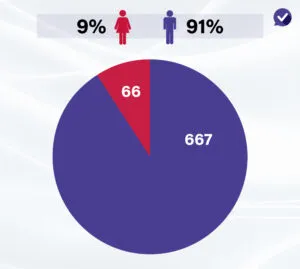
Breakdown of Prisoners by Age
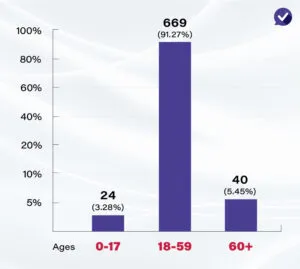
Breakdown of Prisoners by Charges
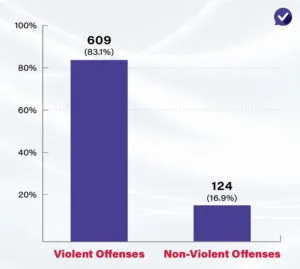
Violent offenses include murder, attempted murder, possession of weapons, kidnapping, rock-throwing, shooting, production of weapons, and assault.
Non-violent offenses include membership in a terror org, incitement, and breach of probation.
Sentenced Prisoners v Detainees
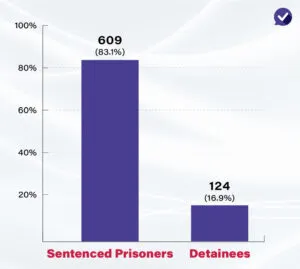
Breakdown of Prisoners by Terror Affiliation
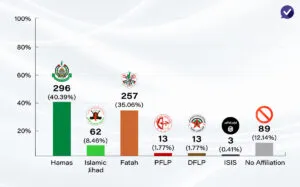
Fatah includes Al-Aqsa Martyrs Brigades
Prisoners Remaining in Region v Prisoners Being Exiled to a Third Country
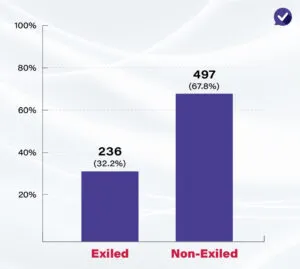
Who Are the Most Dangerous Prisoners on the List?
Among the 733 Palestinian prisoners slated to be released as part of the ceasefire deal are many with Israeli blood on their hands, including terrorist leaders and masterminds.
The following are just some of the most dangerous Palestinian terrorists set to be let go in the coming weeks:
Zakaria Zubeidi
- Served as chief of the Fatah-aligned Al-Aqsa Martyrs Brigades in Jenin during the Second Intifada.
- Was involved in several terror attacks, including the 2002 bombing of Likud headquarters in Beit Shean, which killed six Israelis.
- Was given amnesty by Israel in 2007 in return for renouncing violence.
- Arrested in 2019 for shooting at two Israeli civilian buses in the West Bank.
- Took part in the 2021 breakout from Gilboa Prison. Was re-arrested a few days later.
Tabat Mardawi
- Senior Islamic Jihad leader from Jenin.
- Responsible for several bombings and shootings during the Second Intifada, including the suicide bombing of Bus #83 in Afula and the suicide attacks on the Binyamina and Hadera central bus stations.
- Serving 21 life sentences and an additional 40 years in prison for his role in the murder of 21 Israelis and the wounding of 190 more.
Ahmed Barghouti
- Senior aide and cousin of notorious Palestinian terrorist and prisoner Marwan Barghouti.
- Served as the head of Al-Aqsa Martyrs Brigades in Ramallah.
- Orchestrated several bombing and shooting attacks during the Second Intifada, including a shooting spree on Jaffa Street in Jerusalem, a suicide attack at the Maccabim checkpoint, and a shooting attack at a Tel Aviv seafood restaurant.
- Serving 13 life sentences for his role in the murder of 12 Israeli civilians.
Mohammad Abu Warda
- Member of Hamas.
- Serving 48 life sentences for orchestrating the 1996 suicide bombing attacks on the number 18 bus line in Jerusalem, which killed 45 people.
- Described by the military prosecutor as “a mass murderer standing before the court today.”
Mohammed Naifeh
- Member of Al-Aqsa Martyrs Brigades.
- Serving 13 life sentences for dispatching the terrorists in the 2002 attacks on Kibbutz Metzer and Hermesh, which killed 8 Israelis (including a 34-year-old woman and her two infant children).
- In 2018, was accused of attempting to orchestrate a terror attack from prison.
- Considered to be one of the “most senior Palestinian prisoners in Israel.”
The Silwan Squad
- Three members (Wael Qassem, Wissam Abasi, and Muhammad Odeh) of the four-person Hamas cell are slated to be released.
- Orchestrated five terror attacks between March and June 2022, including the suicide attacks on Café Moment in Jerusalem, the Sheffield Club in Rishon Letzion, and Hebrew University in Jerusalem.
- Serving multiple life sentences for the murder of 35 people (including four Americans) and the wounding of hundreds more.
Mahmoud Attallah
- Member of Fatah.
- Serving one life sentence and 15 years for the 2003 murder of a Palestinian woman suspected of collaborating with Israeli security forces.
- Accused of the rape and sexual abuse of female Israeli prison guards while incarcerated at Gilboa Prison.
Mahmoud Atallah-
Murdered a Palestinian woman because she was suspected of collaborating with Israel
Accused of rape and sexual harassment of 6 female guards pic.twitter.com/yyhPETxXCr— Adin – عدین – עדין (@AdinHaykin1) January 18, 2025
Ahmad Obeid
- Head of Hamas terror cell in Jerusalem.
- Dispatched the suicide bomber who blew up Café Hillel in Jerusalem, killing seven people and wounding 64 more.
- Serving 7 life sentences.
Sami Jaradat
- Islamic Jihad operative from Jenin.
- Dispatched the suicide bomber (who happened to be his close relative) who blew up Maxim Restaurant in Haifa, killing 21 people and wounding 60 more.
- Serving 21 life sentences and 50 more years of imprisonment.
Abdullah Sharbati, Majdi Zaatari & Samer al-Atrash
- Members of a Hamas terror cell based in Jerusalem.
- Orchestrated the suicide bombing attacks on Jerusalem bus #2 (which killed 23 people, including 7 children), Jerusalem bus #14, and Jerusalem bus #6.
- Planned future terror attacks, including a suicide bombing of a banquet hall, the kidnapping of IDF soldiers, and the mass-poisoning of a Beit Shemesh delicatessen’s food supply.
The author is a contributor to HonestReporting, a Jerusalem-based media watchdog with a focus on antisemitism and anti-Israel bias — where a version of this article first appeared.
The post Terror Leaders & Operatives: More Details on the Palestinian Prisoners That Have Been Set Free first appeared on Algemeiner.com.
RSS
Hamas Says No Interim Hostage Deal Possible Without Work Toward Permanent Ceasefire

Explosions send smoke into the air in Gaza, as seen from the Israeli side of the border, July 17, 2025. Photo: REUTERS/Amir Cohen
The spokesperson for Hamas’s armed wing said on Friday that while the Palestinian terrorist group favors reaching an interim truce in the Gaza war, if such an agreement is not reached in current negotiations it could revert to insisting on a full package deal to end the conflict.
Hamas has previously offered to release all the hostages held in Gaza and conclude a permanent ceasefire agreement, and Israel has refused, Abu Ubaida added in a televised speech.
Arab mediators Qatar and Egypt, backed by the United States, have hosted more than 10 days of talks on a US-backed proposal for a 60-day truce in the war.
Israeli officials were not immediately available for comment on the eve of the Jewish Sabbath.
Israeli Prime Minister Benjamin Netanyahu’s office said in a statement on a call he had with Pope Leo on Friday that Israel‘s efforts to secure a hostage release deal and 60-day ceasefire “have so far not been reciprocated by Hamas.”
As part of the potential deal, 10 hostages held in Gaza would be returned along with the bodies of 18 others, spread out over 60 days. In exchange, Israel would release a number of detained Palestinians.
“If the enemy remains obstinate and evades this round as it has done every time before, we cannot guarantee a return to partial deals or the proposal of the 10 captives,” said Abu Ubaida.
Disputes remain over maps of Israeli army withdrawals, aid delivery mechanisms into Gaza, and guarantees that any eventual truce would lead to ending the war, said two Hamas officials who spoke to Reuters on Friday.
The officials said the talks have not reached a breakthrough on the issues under discussion.
Hamas says any agreement must lead to ending the war, while Netanyahu says the war will only end once Hamas is disarmed and its leaders expelled from Gaza.
Almost 1,650 Israelis and foreign nationals have been killed as a result of the conflict, including 1,200 killed in the Oct. 7, 2023, Hamas attack on southern Israel, according to Israeli tallies. Over 250 hostages were kidnapped during Hamas’s Oct. 7 onslaught.
Israel responded with an ongoing military campaign aimed at freeing the hostages and dismantling Hamas’s military and governing capabilities in neighboring Gaza.
The post Hamas Says No Interim Hostage Deal Possible Without Work Toward Permanent Ceasefire first appeared on Algemeiner.com.
RSS
Iran Marks 31st Anniversary of AMIA Bombing by Slamming Argentina’s ‘Baseless’ Accusations, Blaming Israel

People hold images of the victims of the 1994 bombing attack on the Argentine Israeli Mutual Association (AMIA) community center, marking the 30th anniversary of the attack, in Buenos Aires, Argentina, July 18, 2024. Photo: REUTERS/Irina Dambrauskas
Iran on Friday marked the 31st anniversary of the 1994 bombing of the Argentine Israelite Mutual Association (AMIA) Jewish community center in Buenos Aires by slamming Argentina for what it called “baseless” accusations over Tehran’s alleged role in the terrorist attack and accusing Israel of politicizing the atrocity to influence the investigation and judicial process.
The Iranian Foreign Ministry issued a statement on the anniversary of Argentina’s deadliest terrorist attack, which killed 85 people and wounded more than 300.
“While completely rejecting the accusations against Iranian citizens, the Islamic Republic of Iran condemns attempts by certain Argentine factions to pressure the judiciary into issuing baseless charges and politically motivated rulings,” the statement read.
“Reaffirming that the charges against its citizens are unfounded, the Islamic Republic of Iran insists on restoring their reputation and calls for an end to this staged legal proceeding,” it continued.
Last month, a federal judge in Argentina ordered the trial in absentia of 10 Iranian and Lebanese nationals suspected of orchestrating the attack in Buenos Aires.
The ten suspects set to stand trial include former Iranian and Lebanese ministers and diplomats, all of whom are subject to international arrest warrants issued by Argentina for their alleged roles in the terrorist attack.
In its statement on Friday, Iran also accused Israel of influencing the investigation to advance a political campaign against the Islamist regime in Tehran, claiming the case has been used to serve Israeli interests and hinder efforts to uncover the truth.
“From the outset, elements and entities linked to the Zionist regime [Israel] exploited this suspicious explosion, pushing the investigation down a false and misleading path, among whose consequences was to disrupt the long‑standing relations between the people of Iran and Argentina,” the Iranian Foreign Ministry said.
“Clear, undeniable evidence now shows the Zionist regime and its affiliates exerting influence on the Argentine judiciary to frame Iranian nationals,” the statement continued.
In April, lead prosecutor Sebastián Basso — who took over the case after the 2015 murder of his predecessor, Alberto Nisman — requested that federal Judge Daniel Rafecas issue national and international arrest warrants for Iran’s Supreme Leader Ayatollah Ali Khamenei over his alleged involvement in the attack.
Since 2006, Argentine authorities have sought the arrest of eight Iranians — including former president Ali Akbar Hashemi Rafsanjani, who died in 2017 — yet more than three decades after the deadly bombing, all suspects remain still at large.
In a post on X, the Delegation of Argentine Israelite Associations (DAIA), the country’s Jewish umbrella organization, released a statement commemorating the 31st anniversary of the bombing.
“It was a brutal attack on Argentina, its democracy, and its rule of law,” the group said. “At DAIA, we continue to demand truth and justice — because impunity is painful, and memory is a commitment to both the present and the future.”
31 años del atentado a la AMIA – DAIA. 31 años sin justicia.
El 18 de julio de 1994, un atentado terrorista dejó 85 personas muertas y más de 300 heridas. Fue un ataque brutal contra la Argentina, su democracia y su Estado de derecho.
Desde la DAIA, seguimos exigiendo verdad y… pic.twitter.com/kV2ReGNTIk
— DAIA (@DAIAArgentina) July 18, 2025
Despite Argentina’s longstanding belief that Lebanon’s Shiite Hezbollah terrorist group carried out the devastating attack at Iran’s request, the 1994 bombing has never been claimed or officially solved.
Meanwhile, Tehran has consistently denied any involvement and refused to arrest or extradite any suspects.
To this day, the decades-long investigation into the terrorist attack has been plagued by allegations of witness tampering, evidence manipulation, cover-ups, and annulled trials.
In 2006, former prosecutor Nisman formally charged Iran for orchestrating the attack and Hezbollah for carrying it out.
Nine years later, he accused former Argentine President Cristina Fernández de Kirchner — currently under house arrest on corruption charges — of attempting to cover up the crime and block efforts to extradite the suspects behind the AMIA atrocity in return for Iranian oil.
Nisman was killed later that year, and to this day, both his case and murder remain unresolved and under ongoing investigation.
The alleged cover-up was reportedly formalized through the memorandum of understanding signed in 2013 between Kirchner’s government and Iranian authorities, with the stated goal of cooperating to investigate the AMIA bombing.
The post Iran Marks 31st Anniversary of AMIA Bombing by Slamming Argentina’s ‘Baseless’ Accusations, Blaming Israel first appeared on Algemeiner.com.
RSS
Jordan Reveals Muslim Brotherhood Operating Vast Illegal Funding Network Tied to Gaza Donations, Political Campaigns

Murad Adailah, the head of Jordan’s Muslim Brotherhood, attends an interview with Reuters in Amman, Jordan, Sept. 7, 2024. Photo: REUTERS/Jehad Shelbak
The Muslim Brotherhood, one of the Arab world’s oldest and most influential Islamist movements, has been implicated in a wide-ranging network of illegal financial activities in Jordan and abroad, according to a new investigative report.
Investigations conducted by Jordanian authorities — along with evidence gathered from seized materials — revealed that the Muslim Brotherhood raised tens of millions of Jordanian dinars through various illegal activities, the Jordan news agency (Petra) reported this week.
With operations intensifying over the past eight years, the report showed that the group’s complex financial network was funded through various sources, including illegal donations, profits from investments in Jordan and abroad, and monthly fees paid by members inside and outside the country.
The report also indicated that the Muslim Brotherhood has taken advantage of the war in Gaza to raise donations illegally.
Out of all donations meant for Gaza, the group provided no information on where the funds came from, how much was collected, or how they were distributed, and failed to work with any international or relief organizations to manage the transfers properly.
Rather, the investigations revealed that the Islamist network used illicit financial mechanisms to transfer funds abroad.
According to Jordanian authorities, the group gathered more than JD 30 million (around $42 million) over recent years.
With funds transferred to several Arab, regional, and foreign countries, part of the money was allegedly used to finance domestic political campaigns in 2024, as well as illegal activities and cells.
In April, Jordan outlawed the Muslim Brotherhood, the country’s most vocal opposition group, and confiscated its assets after members of the Islamist movement were found to be linked to a sabotage plot.
The movement’s political arm in Jordan, the Islamic Action Front, became the largest political grouping in parliament after elections last September, although most seats are still held by supporters of the government.
Opponents of the group, which is banned in most Arab countries, label it a terrorist organization. However, the movement claims it renounced violence decades ago and now promotes its Islamist agenda through peaceful means.
The post Jordan Reveals Muslim Brotherhood Operating Vast Illegal Funding Network Tied to Gaza Donations, Political Campaigns first appeared on Algemeiner.com.
